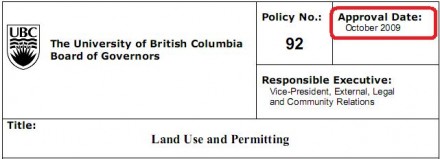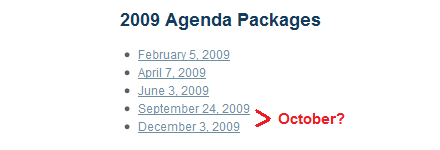Board of Governors Invents Secretive Voting Procedure
Posted By Neal Yonson On January 11, 2010 @ 10:00 am In Investigative | Comments Disabled
Last fall, the Board of Governors gave its consent to UBC’s newest policy, Policy 92: Land Use and Permitting [1]. Look closely at the top right-hand corner of the policy. The approval date listed is October 2009.
 [2].
[2].
.
One problem: the Board never met in October..
..
 [3]From BoG website. [4]
[3]From BoG website. [4]
The creation of Policy 92 has brought to light a virtually unknown practice of the Board of Governors: e-mail voting using implicit consent. This is the method by which Policy 92 was passed while the Board had no scheduled meetings.
“When a motion is passed by consent that means nobody opposed, including the students, to not pass that,” explained Bijan Ahmadian, student Board rep. “What happens is that Reny [Kahlon, Board Secretary] sends out the e-mail and says ‘This is a consent item, does anybody want to call a meeting on this?’” If there are no responses received by a set deadline, it is considered to be passed.
The practice raises a number of concerns.
There is a distinct lack of transparency with e-mail voting. Business conducted outside of meetings via e-mail does not get recorded in agendas or minutes of the board. The Board Secretary confirmed that at the same time as the Board was created Policy 92, it also repealed Policy 116: Commercial Agreements Initiated by External Affairs and the Freedom of Information and Protection of Privacy Act [5]. Without a word, the policy simply disappeared from UBC’s list of policies [6] (but thankfully not from the internet archive sites).
It’s only a lucky side effect that the creation of Policy 92 resulted in a document that is posted publicly, including its approval date. Otherwise, this may not have come to light as easily. Many decisions made by the Board, if made by e-mail, would be rendered effectively invisible. It raises questions about the existence of other decisions made outside of regularly scheduled meetings and for which there exists no public record. Although it was mentioned that e-mail voting occurs irregularly, only board members can say for certain how often it occurs, and what items get dealt with in this way.
Secondly, it appears unlikely the Board even has the authority to approve things in this manner. When the Board Secretary was contacted about the legitimacy of e-mail approval, the following information was cited:
University Act, section 26(1): The Chair has the same right to vote as the other members of the Board. In the case of a tie vote on a motion, the motion is defeated, and the Chair must so declare.
A resolution in writing, signed by all of the Governors who would be entitled to vote on that resolution at a meeting of the Board, is as valid as if it had been passed at a meeting of the Board.
It would be an interesting question to consider whether implicit approval to an e-mail is equivalent to “a resolution in writing, signed by all of the Governors.” However, it’s a moot point because the information quoted above is incorrect. The second paragraph is not actually contained in the University Act [7]! Everything in the Act suggests that the board must actually meet to conduct business.
There may be one argument made under section 27(2)(a) of the Act [8], which says the board has the power “to make rules for the meetings of the board and its transactions”. The Board’s procedures page [9] says that “Additional meetings may be scheduled for urgent matters only,” but makes no mention of the practice of e-mail voting.
One last issue is that the reason e-mail voting was used is because they were considered “consent items.” Consent items occur when the decision has been made by another body (e.g. Senate) and the Board’s role is to rubber-stamp it. University policies are not consent items. The Board is the only source of approval to create or repeal these policies.
The practice is secretive, and more than likely not legitimate. The Board should be made to explain why these policy decisions were not made openly, and why records are not generated for these decisions.
The implications of each policy decision also have questionable motives behind them. Check back later for more details.
Please give us your support [10] in the continuous VFM competition. It helps keep us motivated to continue digging up stories and bringing you exclusive, original reporting.
Article printed from UBC Insiders: http://ubcinsiders.ca
URL to article: http://ubcinsiders.ca/2010/01/board-of-governors-invents-voting-procedure/
URLs in this post:
[1] Policy 92: Land Use and Permitting: http://www.universitycounsel.ubc.ca/policies/policy92.pdf
[2] Image: http://blogs.ubc.ca/ubcinsiders/files/2010/01/Policy92.jpg
[3] Image: http://blogs.ubc.ca/ubcinsiders/files/2010/01/bogmeetings09.png
[4] From BoG website.: http://bog.ubc.ca/meetings.html
[5] Policy 116: Commercial Agreements Initiated by External Affairs and the Freedom of Information and Protection of Privacy Act: http://blogs.ubc.ca/ubcinsiders/files/2010/01/policy116.pdf
[6] UBC’s list of policies: http://www.universitycounsel.ubc.ca/policies/policies.html
[7] University Act: http://www.bclaws.ca/Recon/document/freeside/--%20U%20--/University%20Act%20%20RSBC%201996%20%20c.%20468/00_96468_01.xml
[8] section 27(2)(a) of the Act: http://www.bclaws.ca/Recon/document/freeside/--%20U%20--/University%20Act%20%20RSBC%201996%20%20c.%20468/00_96468_01.xml#section27
[9] procedures page: http://bog.ubc.ca/about/procedures.html
[10] give us your support: http://votermedia.org/communities/82-ubc-ams
Click here to print.